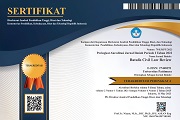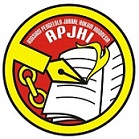Model Pengembangan Ekonomi Kreatif Bagi Usaha Mikro Kecil dan Menengah di Tengah Ancaman Resesi Ekonomi Berdasarkan Syirkah Mudharabah
 )
)
(1) Fakultas Hukum Universitas Jember, Jember, Indonesia
 Corresponding Author
Corresponding Author
Abstract
Keywords
DOI
10.47268/ballrev.v3i1.719
Published
2022-05-16
How To Cite
@article{BALLREV719,
author = {Dyah Susanti},
title = {Model Pengembangan Ekonomi Kreatif Bagi Usaha Mikro Kecil dan Menengah di Tengah Ancaman Resesi Ekonomi Berdasarkan Syirkah Mudharabah},
journal = {Batulis Civil Law Review},
volume = {3},
number = {1},
year = {2022},
keywords = {Micro, Small, and Medium Enterprises; Economic Recession; Syirkah Mudharabah},
abstract = {This research is motivated by the existence of a recession in Indonesia, where the recession affects and has an impact on economic activity, such as a decrease in investment, the level of production or commodities, an increase in unemployment, an increase in prices for goods in general (inflation), a reduction in subsidies and government funding, and a decrease purchasing power and public consumption, which of course also has an impact, especially on Micro, Small, and Medium Enterprises (MSME). In this regard, it is necessary to develop MSME in the midst of the threat of an economic recession, one of which is through business cooperation based on syirkah mudharabah. Research that uses the normative legal research with the statute approach, and conceptual approach, results in findings, namely the concept or model of creative economic development for MSME in the midst of an economic recession based on syirkah mudharabah. This model is expected to be used by business actors to develop MSME amid the Covid-19 pandemic.},
issn = {2746-8151}, pages = {60--75} doi = {10.47268/ballrev.v3i1.719},
url = {https://fhukum.unpatti.ac.id/jurnal/ballrev/article/view/719}
}
Anggraeni, R. (2020). 85,42% UMKM Terancam Bangkrut, Cuma Tahan Covid-19 Selama 1 Tahun. Okezone.Com. https://economy.okezone.com/read/2020/08/06/320/2257905/85-42-umkm-terancam-bangkrut-cuma-tahan-covid-19-selama-1-tahun
Asiati, D., & Nawawi. (2017). Kemitraan Di Sektor Perikanan Tangkap: Strategi Untuk Kelangsungan Usaha Dan Pekerjaan. Jurnal Kependudukan Indonesia, 11(2), 103–118.
Az-Zuhaili, W. (2011). Kitab Fiqhul Islam Wa Adillatuhu. Darul Fikr.
BPS Kabupaten Situbondo. (2017). Luas Panen dan Produksi Ubi Kayu dan Ubi Jalar Menurut Kecamatan di Kabupaten Situbondo, 2016. Situbondokab.Bps.Go.Id. https://situbondokab.bps.go.id/statictable/2017/06/02/507/luas-panen-dan-produksi-ubi-kayu-dan-ubi-jalar-menurut-kecamatan-di-kabupaten-situbondo-2016.html.
Hadi, R. (2019). Analisis Praktek Jual Beli Dropshipping Dalam Perspektif Ekonomi Islam Latar Belakang Masalah. AT-TAWASSUTH: Jurnal Ekonomi Islam, 4(2), 231–251. https://doi.org/10.30829/ajei.v4i2.5548
Hamdani, T. (2020). Digencet Corona, UMKM PHK hingga Rumahkan Karyawan. DetikFinance. https://finance.detik.com/berita-ekonomi-bisnis/d-5039085/digencet-corona-umkm-phk-hingga-rumahkan-karyawan
Hermawan, R. (2014). Analisis Akad Mudharabah Dalam Lembaga Keuangan Syari’ah. Et-Tijarie: Jurnal Hukum Dan Bisnis Syariah, 1(1), 18–33.
Kusuma, H. (2020). Mulai Oktober RI Resesi, Perlukah Kita Panik? DetikFinance. https://finance.detik.com/berita-ekonomi-bisnis/d-5194369/mulai-oktober-ri-resesi-perlukah-kita-panik?_ga=2.53753824.977715524.1601501455-1003093696.1574129645
Marleni, I., & Kasnelly, S. (2019). Penerapan Akad Mudharabah Pada Perbankan Syariah. Al-Mizan: Jurnal Ekonomi Syariah, 2(2), 51–68.
Martoyo. (2020). Pendirian Perseroan Terbatas Berdasar Akad Syirkah Mudharabah. Universitas Jember.
Mufid, M. (2018). Maqashid Ekonomi Syariah : Tujuan dan Aplikasi. Empat Dua Media.
Muhamad. (2017). Lembaga Perekonomian Islam: Perspektif Hukum, Teori, dan Aplikasi. UPP STIM YKPN.
Rinawati, H. S., & Sadewo, F. S. (2019). Pengembangan Model Kemitraan UMKM dengan Usaha Skala Sedang dan Besar di Jawa Timur Melalui Program Corporate Social Responsibility (CSR). Matra Pembaruan: Jurnal Inovasi Kebijakan, 3(1), 67–77. https://doi.org/10.21787/mp.3.2.2019.67-77
Saripudin, U. (2016). Syirkah dan Aplikasinya dalam Lembaga Keuangan Syariah. E-Qien: Jurnal Ekonomi Dan Bisnis, 3(2), 63–79.
Shalihah, M. (2016). Konsep Syirkah Dalam Waralaba. Jurnal Tahkim, 12(2), 142–153.
Sihono, T. (2009). Dampak Krisis Finansial Amerika Serikat Terhadap Perekonomian Asia. Jurnal Ekonomi Dan Pendidikan, 6(1), 1–20. https://doi.org/10.21831/jep.v6i1.586
Sulaiman, N. (2006, June). Keadilan: Konsep dan Implementasinya dalam Dunia Perbankan. Makalah: Disampaikan Dalam Kuliah Tamu Di Ponpes Al- Khozini.
Susanti, D. O. (2012). Hukum Ekonomi Syariah: Pembentukan Persekutuan Komanditer (Commanditaire Vennootschap) Berdasar akad Musyarakah. Jember University Press.
Susanti, D. O. (2020a). Keagenan (Simsar) Sebagai Upaya Menciptakan Lapangan Kerja Bagi Pekerja Yang Mengalami Pemutusan Hubungan Kerja (PHK) Di Tengah Wabah Corona Virus Disease (Covid-19) (Perspektif Hukum Ekonomi Syariah). DIALEKTIKA: Jurnal Ekonomi Dan Ilmu Sosial, 5(2), 202–213. https://doi.org/10.36636/dialektika.v5i2.450
Susanti, D. O. (2020b). Syirkah Mudharabah Sebagai Model Pengembangan Ekonomi Kreatif Bagi Usaha Mikro Kecil dan Menengah (UMKM) di Tengah Ancaman Resesi Ekonomi.
Susanti, D. O., & Efendi, A. (2014). Penelitian Hukum (Legal Research). Sinar Grafika.
Taufik, M., & Hartono. (2011). Model Pengembangan Usaha Kecil Menengah Berbasis Potensi Ekonomi Masyarakat. Wiga: Jurnal Penelitian Ilmu Ekonomi, 1(1), 1–12.
Wilopo, S. A. (1998). Dampak Resesi Ekonomi Pada Penurunan Kematian dan Peningkatan Angka Harapan Hidup di Indonesia. Populasi, 9(1), 1–23. https://doi.org/10.22146/jp.11686
| Dublin Core | PKP Metadata Items | Metadata for this Document | |
| 1. | Title | Title of document | Model Pengembangan Ekonomi Kreatif Bagi Usaha Mikro Kecil dan Menengah di Tengah Ancaman Resesi Ekonomi Berdasarkan Syirkah Mudharabah |
| 2. | Creator | Author's name, affiliation, country | Dyah Ochtorina Susanti; Fakultas Hukum Universitas Jember, Jember; Indonesia |
| 3. | Subject | Discipline(s) | |
| 3. | Subject | Keyword(s) | Micro, Small, and Medium Enterprises; Economic Recession; Syirkah Mudharabah |
| 4. | Description | Abstract | This research is motivated by the existence of a recession in Indonesia, where the recession affects and has an impact on economic activity, such as a decrease in investment, the level of production or commodities, an increase in unemployment, an increase in prices for goods in general (inflation), a reduction in subsidies and government funding, and a decrease purchasing power and public consumption, which of course also has an impact, especially on Micro, Small, and Medium Enterprises (MSME). In this regard, it is necessary to develop MSME in the midst of the threat of an economic recession, one of which is through business cooperation based on syirkah mudharabah. Research that uses the normative legal research with the statute approach, and conceptual approach, results in findings, namely the concept or model of creative economic development for MSME in the midst of an economic recession based on syirkah mudharabah. This model is expected to be used by business actors to develop MSME amid the Covid-19 pandemic. |
| 5. | Publisher | Organizing agency, location | Faculty of Law, Universitas Pattimura |
| 6. | Contributor | Sponsor(s) | |
| 7. | Date | (YYYY-MM-DD) | 2022-05-16 |
| 8. | Type | Status & genre | Peer-reviewed Article |
| 8. | Type | Type | |
| 9. | Format | File format | |
| 10. | Identifier | Uniform Resource Identifier | https://fhukum.unpatti.ac.id/jurnal/ballrev/article/view/719 |
| 10. | Identifier | Digital Object Identifier | 10.47268/ballrev.v3i1.719 |
| 11. | Source | Title; vol., no. (year) | Batulis Civil Law Review; Vol 3, No 1 (2022): VOLUME 3 NOMOR 1, MEI 2022 |
| 12. | Language | English=en | en |
| 13. | Relation | Supp. Files |
Untitled (696KB) |
| 14. | Coverage | Geo-spatial location, chronological period, research sample (gender, age, etc.) | |
| 15. | Rights | Copyright and permissions | Copyright: Authors who publish their manuscripts in this Journal agree to the following conditions: 1. The copyright in each article belongs to the author, as well as the right to patent. 2. Authors are able to enter into separate, additional contractual arrangements for the non-exclusive distribution of the journal's published version of the work (e.g., post it to an institutional repository or publish it in a book), with an acknowledgment of its initial publication in this journal. 3. Authors are permitted and encouraged to post their work online (e.g., in institutional repositories or on their website) prior to and during the submission process, as it can lead to productive exchanges, as well as earlier and greater citation of published work. 4. Authors have the right to self-archiving of the article (Author Self-Archiving Policy)
Licence : Batulis Civil Law Review Journal is disseminated based on the Creative Commons Attribution-NonCommercial 4.0 International license terms. This license allows anyone to copy and redistribute this material in any form or format, compose, modify, and make derivatives of this material for any purpose. You cannot use this material for commercial purposes. You must specify an appropriate name, include a link to the license, and certify that any changes have been made. You can do this in a way that is appropriate, but does not imply that the licensor supports you or your use.
|
Copyright (c) 2022 Dyah Ochtorina Susanti

This work is licensed under a Creative Commons Attribution-NonCommercial 4.0 International License.

 : 4707 times
: 4707 times Download : 2988 times
Download : 2988 times














